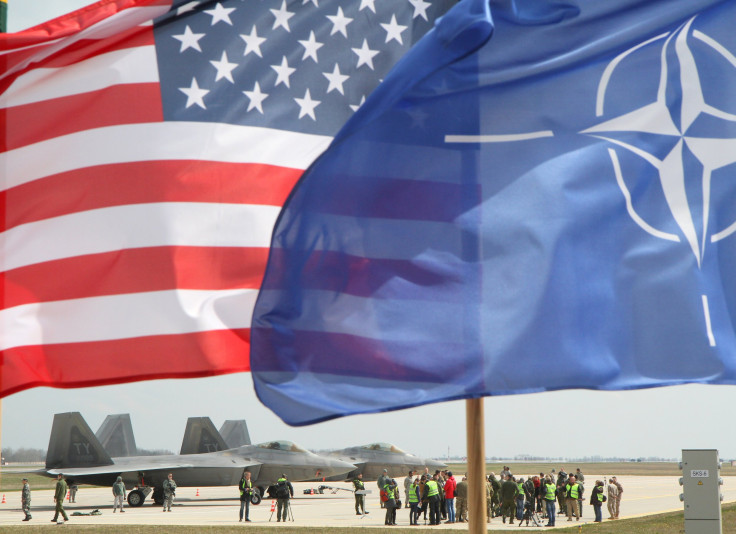Quotes From Donald Trump On NATO: What Republican Candidate Said About North Atlantic Treaty Organization And US Obligations

The North Atlantic Treaty Organization (NATO) has not significantly factored into recent American presidential elections, but Republican nominee Donald Trump has changed all that.
When asked by the New York Times late Wednesday if he would come to the aid of the Baltic States – Estonia, Latvia and Lithuania – if they were attacked by Russia, Trump said he would only do so if the countries “have fulfilled their obligations to us,” marking a sharp turn from decades of American foreign policy that has been a cornerstone of European security. Asked what he would do if countries had not fulfilled their obligations, Trump responded, “Well, I’m not saying if not. I’m saying, right now there are many countries that have not fulfilled their obligations to us.”
The 28-members of the military and political alliance are expected to devote 2 percent of their gross domestic product toward defense. Many members of the alliance have begun increasing their contributions following Russia’s illegal annexation of Crimea from Ukraine in March 2014. Neighboring states have also been uneasy since a war began in Eastern Ukraine in April 2014 pitting Ukrainian government forces against Russia-backed separatists. Russia has continued to deny sending its troops into Ukraine to fight in the conflict despite evidence to the contrary.
Wednesday’s remarks are not the first Trump has made about the alliance that was formed in 1949 in the aftermath of World War II. Trump called NATO “obsolete” in March and questioned why the U.S. provides large financial contributions to the organization.
The New York billionaire hinted while campaigning in April that if elected president he would consider withdrawing the U.S. from the alliance. “It's possible that we’re going to have to let NATO go,” he said. “When we’re paying and nobody else is really paying, a couple of other countries are but nobody else is really paying, you feel like the jerk.”
He went on to say that he would “call up all of those countries . . . and say ‘fellas you haven’t paid for years, give us the money or get the hell out.’ I’d say you've gotta pay us or get out. You're out, out, out . . . Maybe NATO will dissolve, and that’s OK, not the worst thing in the world.”
Politicians and world leaders were quick to respond to Trump’s remarks Thursday and what it would mean if the U.S. did not abide by its NATO treaty obligations.
We have had decades of bipartisan commitment to NATO, which has made it the greatest alliance in history. Trump is now threatening that.
— Michael McFaul (@McFaul) July 21, 2016
We are equally committed to a l l our NATO allies, regardless of who they may be. That's what makes them allies.
— toomas hendrik ilves (@IlvesToomas) July 21, 2016
The GOP nominee for President is essentially telling Russians/other bad actors the US is not fully committed to supporting NATO alliance.
— Lindsey Graham (@LindseyGrahamSC) July 21, 2016
Despite Trump remarks on @NATO, @PressSec stresses the US commitment to alliance principle of "mutual self-defense" is "iron clad."
— Mark Knoller (@markknoller) July 21, 2016
Statement from NATO re Trump comments -- pic.twitter.com/iNmGjIt4ML
— Jake Tapper (@jaketapper) July 21, 2016
Trump supporter Newt Gingrich came to the GOP presidential nominee's defense Thursday while speaking with “CBS This Morning,” agreeing that NATO members should worry about the U.S.’s commitment if they do not meet their financial contributions.
“Estonia is in the suburbs of St. Petersburg,” Gingrich said. “The Russians aren't gonna necessarily come across the border militarily. The Russians are gonna do what they did in Ukraine. I’m not sure I would risk a nuclear war over some place which is the suburbs of St. Petersburg. I think we have to think about what does this stuff mean.”
The Baltic States along with Poland and other members have called for an increased NATO presence in Eastern Europe to counter Russian aggression and American support in the region. When asked about Trump’s comments on NATO in early July, Latvia’s Defense Minister Raimonds Bergmanis told International Business Times that he disagreed with the Republican nominees views on the alliance.
“NATO is by no means obsolete because it is still effective and by far has been the most successful collective defense organization in the history,” he said. “NATO has shown its ability to solve security crises around the world, provide collective defense guarantees and facilitate cooperation in the field of security.”
© Copyright IBTimes 2024. All rights reserved.












